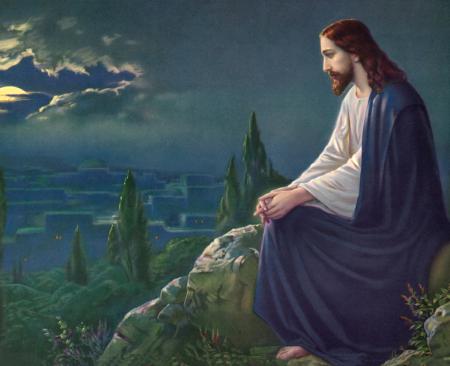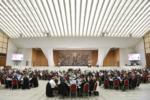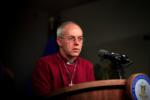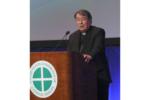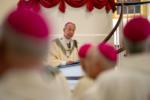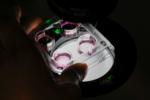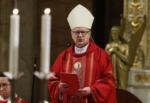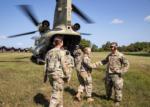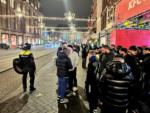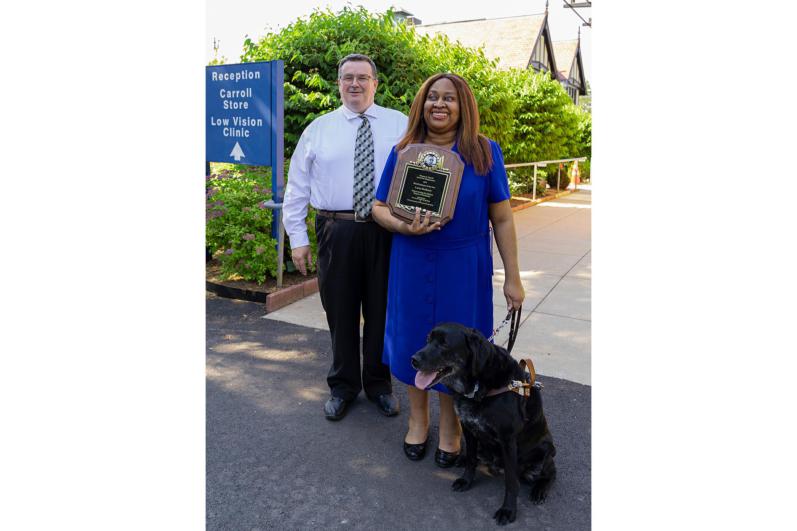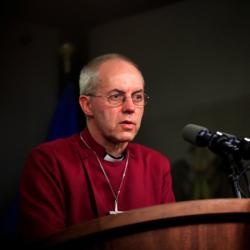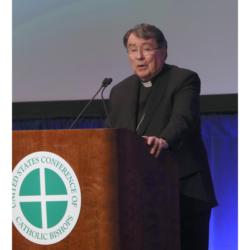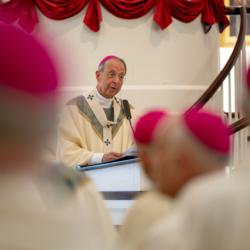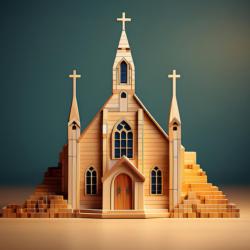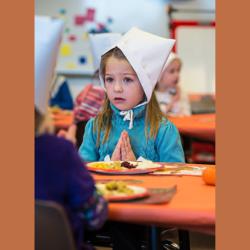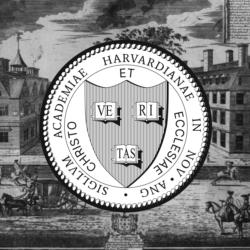DesRoses recognized with Blind Employee of the Year Award
BRAINTREE -- Lorna DesRoses, the Archdiocese of Boston's Evangelization Consultant for Ethnic Communities, jokes that she could write a book about faith and disability.
DesRoses was born with glaucoma, cataracts, and nystagmus, a condition that causes involuntary repetitive eye movement. She has been almost entirely blind for much of her life and first came to Boston to receive treatment for her vision. While attending public high school in Boston, an instructor from the Newton-based Carroll Center for the Blind taught her how to use large-print software on her computer. Her first job after graduating from Regis College was as a receptionist at the Carroll Center. There, she took computer and Braille reading classes and received orientation and mobility training.
"They helped me to discover my vocation," she told The Pilot in a June 18 interview, "and I had a lot of support from a lot of instructors to help me develop the skills I needed."
For her 20 years of service to the Archdiocese of Boston, DesRoses received the Blind Employee of the Year Award from the Carroll Center for the Blind and the Massachusetts Commission for the Blind on June 13. The award goes to a blind employee who has "made significant contributions to their companies by their outstanding ability and job performance."
DesRoses told The Pilot that it was a "deep honor" to receive the award.
The Carroll Center for the Blind is named for Father Thomas Carroll, a priest who was a pioneer in studying and treating blindness. Father Carroll served soldiers blinded during World War II, founded the American Center for Research in Blindness and Rehabilitation, established St. Paul's Rehabilitation Center for the Blind, and founded another rehabilitation center for age-induced blindness with the Archdiocese of Boston. At a time when blind people were largely viewed as helpless, Father Carroll saw their ability to be independent and successful with proper training.
DesRoses described the training she received at the Carroll Center as not only physical but spiritual.
"I got to know a lot of the instructors and the administrators there," she said, "and some of the students who were going through the program. So, I got to see firsthand the wonderful work that they do. They were really dedicated to Father Carroll's legacy."
In the Archdiocese of Boston, DesRoses is responsible for communicating with parish ethnic communities in an increasingly diverse archdiocese. She likes to joke with her coworkers that "you never know when you are sitting across from a saint" because of the many people she has met who care deeply about their faith and culture.
"It has been a privilege," DesRoses said. "It's been an honor. I've met some absolutely wonderful, faithful people who want to share the good news of Jesus and want to strengthen their communities."
Her office, located on the third floor of the archdiocese's Pastoral Center in Braintree, is decorated with art representing her Haitian heritage, and images of saints of African descent. She shares the office with her guide dog, Aster. DesRoses is currently working with archdiocesan video producer Ann Gennaro on a documentary about the history of Black Catholics in Boston, a history which began long before the Civil Rights Movement and the archdiocese beginning to reach out to Black Catholics in the 1980s.
DesRoses was born in New York City to parents who came to the U.S. from Haiti.
"My parents were faithful people," she said, "and I think that in general is something about Haitians. (They are) very prayer-filled people. The church was always at the center of what you did and who you are."
When she was a little girl, her parents sent her to live in Haiti until she was old enough to attend school. She remembers playing with her many cousins and going to church with her grandmother, who attended Mass daily. Even if she couldn't see her grandmother, DesRoses always knew she was there. She would hear her praying the rosary, which was always in her hands.
"If you weren't going to Mass with her," she recalled, "then on a Friday afternoon you'd be the one going to help her with preparing the church. She washed the linens, she cleaned. She was that person in the parish that would do a lot, and she was also someone who would share her faith with others."
When she found work at the Archdiocese of Boston, "it was a blessing," she said.
She approached the archdiocese to see if there were any open positions and found that the archdiocese needed a director of its Office of Black Catholics. She wasn't sure whether to apply, but her husband encouraged her. At the time, she was teaching English to immigrants who had come to Boston from around the world.
"I think it's important for us Catholics to know that our church here in this archdiocese is very diverse," she said. "The history in the archdiocese has been very rich, because it's a history of people coming to Boston from other places."
She pointed out that catholic with a lowercase c means "universal" and that Boston's Catholic Church has always been a church of immigrants. Boston's Catholics once came from Europe, she said, but are now coming from Latin America, Africa, and Asia.
"They bring a richness of their faith," she said. "They bring a richness of the way in which they are sharing the Gospel with so many of their brothers and sisters. When you come to this country, I think that many people, as they are adjusting to the language, the culture, the one thing that they know for sure is their faith."
DesRoses said that the faith is especially an "anchor" for the many migrants, largely fleeing violence and poverty in Haiti, whose arrival in Massachusetts in massive numbers has created a humanitarian crisis in the past year. She estimates that 85 percent of those migrants are "brothers and sisters in faith." They might not speak the same language as many of their fellow Catholics, she said, but the rosary and the Sign of the Cross are universal
"It brings comfort to another person to know I may not be able to communicate with you, but I'm able to pray with you," she said. "I've had those experiences attending Masses across the archdiocese in communities where those are languages I don't understand."
She did not need to know the language because she knew that they were together for a shared purpose: Receiving the Word and the Eucharist.
Looking back on her 20 years at the archdiocese, she said she was grateful for the help of Cardinal Seán P. O'Malley, Vicar General Bishop Mark O'Connell, and Bishop Cristiano Barbosa, whose February ordination she called "a little slice of heaven." Bishop Barbosa made history as Boston's first bishop of Brazilian descent, but DesRoses noticed Catholic communities from all over the world at the Cathedral of the Holy Cross that day.
"They are evangelizing us in many ways," she said. "And that's thanks to the many missionaries who left Boston and came to many countries to evangelize and live their lives out in these places. And now the people from those places are coming here and they are evangelizing us," she said.
DesRoses believes that the process of ethnic unity within the archdiocese is still "ongoing."
"I see that we have within our structure here a better position to outreach and be that bridge and make sure that our communities feel that they have a voice and are connected to the archdiocese," she said. "Will there be difficulties? Of course, we are human beings, but I feel that we're getting better."
She has a similar view on the progress being made to fully welcome people with disabilities into the church. On June 17, she took part in conversations at the 2024 Institute on Theology and Disability conference at Boston College. She found that parishioners with disabilities often "feel like they're on the periphery."
"They're there every Sunday," she said, "but they don't feel that they can serve as lector, because maybe physically they're not able to get up onto the lectern. They don't feel that they've been invited to participate in particular ministries."
Hearing those stories was "painful" for her.
"I would like to see the barriers lowered so that families are able to take their children to Mass and not feel uncomfortable or judged because maybe their child vocalizes," she said. "Whatever that child may have, that they feel that they are at home. They feel that they're part of the community."
